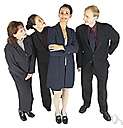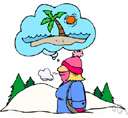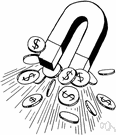attract
Also found in: Thesaurus, Medical, Financial, Idioms, Encyclopedia, Wikipedia.
at·tract
(ə-trăkt′)v. at·tract·ed, at·tract·ing, at·tracts
v.tr.
1. To cause to draw near or adhere by physical force: Magnetic poles are attracted to their opposites.
2. To arouse or compel the interest, admiration, or attention of: We were attracted by the display of lights.
v.intr.
To possess or use the power of attraction.
[Middle English attracten, from Latin attrahere, attract- : ad-, ad- + trahere, pull.]
at·tract′a·ble adj.
American Heritage® Dictionary of the English Language, Fifth Edition. Copyright © 2016 by Houghton Mifflin Harcourt Publishing Company. Published by Houghton Mifflin Harcourt Publishing Company. All rights reserved.
attract
(əˈtrækt)vb (mainly tr)
1. to draw (notice, a crowd of observers, etc) to oneself by conspicuous behaviour or appearance (esp in the phrase attract attention)
2. (General Physics) (also intr) to exert a force on (a body) that tends to cause an approach or oppose a separation: the gravitational pull of the earth attracts objects to it.
3. to possess some property that pulls or draws (something) towards itself: jam attracts wasps.
4. (also intr) to exert a pleasing, alluring, or fascinating influence (upon); be attractive (to)
[C15: from Latin attrahere to draw towards, from trahere to pull]
atˈtractable adj
atˈtractor, atˈtracter n
Collins English Dictionary – Complete and Unabridged, 12th Edition 2014 © HarperCollins Publishers 1991, 1994, 1998, 2000, 2003, 2006, 2007, 2009, 2011, 2014
at•tract
(əˈtrækt)v.t.
1. to draw by a physical force causing or tending to cause to approach, adhere, or unite; pull (opposed to repel): The gravitational force of the earth attracts smaller bodies to it.
2. to draw by appealing to the emotions or senses, by stimulating interest, or by exciting admiration; allure; invite: to attract attention; to attract admirers.
v.i. 3. to possess or exert the power of attraction.
[1400–50; late Middle English < Latin attractus, past participle of attrahere to draw forcefully =at– at– + trahere to draw]
at•trac′tor, n.
Random House Kernerman Webster's College Dictionary, © 2010 K Dictionaries Ltd. Copyright 2005, 1997, 1991 by Random House, Inc. All rights reserved.
attract
Past participle: attracted
Gerund: attracting
| Imperative |
|---|
| attract |
| attract |
Collins English Verb Tables © HarperCollins Publishers 2011
ThesaurusAntonymsRelated WordsSynonymsLegend:
Switch to new thesaurus
| Verb | 1. |  attract - direct toward itself or oneself by means of some psychological power or physical attributes; "Her good looks attract the stares of many men"; "The ad pulled in many potential customers"; "This pianist pulls huge crowds"; "The store owner was happy that the ad drew in many new customers" attract - direct toward itself or oneself by means of some psychological power or physical attributes; "Her good looks attract the stares of many men"; "The ad pulled in many potential customers"; "This pianist pulls huge crowds"; "The store owner was happy that the ad drew in many new customers"tug - pull hard; "The prisoner tugged at the chains"; "This movie tugs at the heart strings" arrest, catch, get - attract and fix; "His look caught her"; "She caught his eye"; "Catch the attention of the waiter" draw in, retract - pull inward or towards a center; "The pilot drew in the landing gear"; "The cat retracted his claws" bring - attract the attention of; "The noise and the screaming brought the curious" |
| 2. |  attract - be attractive to; "The idea of a vacation appeals to me"; "The beautiful garden attracted many people" attract - be attractive to; "The idea of a vacation appeals to me"; "The beautiful garden attracted many people"bewitch, captivate, charm, enamor, enamour, entrance, trance, becharm, beguile, enchant, capture, fascinate, catch - attract; cause to be enamored; "She captured all the men's hearts" beckon - appear inviting; "The shop window decorations beckoned" | |
| 3. |  attract - exert a force on (a body) causing it to approach or prevent it from moving away; "the gravitational pull of a planet attracts other bodies" attract - exert a force on (a body) causing it to approach or prevent it from moving away; "the gravitational pull of a planet attracts other bodies"pull - apply force so as to cause motion towards the source of the motion; "Pull the rope"; "Pull the handle towards you"; "pull the string gently"; "pull the trigger of the gun"; "pull your knees towards your chin" |
Based on WordNet 3.0, Farlex clipart collection. © 2003-2012 Princeton University, Farlex Inc.
attract
verb
1. allure, interest, draw, invite, persuade, engage, charm, appeal to, fascinate, win over, tempt, lure (informal), induce, incline, seduce, entice, enchant, endear, lead on, coax, captivate, beguile, cajole, bewitch, decoy, inveigle, pull, catch (someone's) eye Summer attracts visitors to the countryside.
allure disgust, revolt, repel, repulse, put you off, turn you off (informal), give you the creeps (informal)
allure disgust, revolt, repel, repulse, put you off, turn you off (informal), give you the creeps (informal)
Collins Thesaurus of the English Language – Complete and Unabridged 2nd Edition. 2002 © HarperCollins Publishers 1995, 2002
attract
verb1. To direct or impel to oneself by some quality or action:
Informal: pull.
The American Heritage® Roget's Thesaurus. Copyright © 2013, 2014 by Houghton Mifflin Harcourt Publishing Company. Published by Houghton Mifflin Harcourt Publishing Company. All rights reserved.
Translations
يَجْذِبيَسْتَرعي الإنْتِباه، يَجْذِب الإنْتِباه
přitáhnoutpřitahovatpřivábit
tiltrækkedrage
viehättää
privući
felkelt
draga aî sérdraga til sín, laîa
ひきつける
끌어당기다
masintipagundapatraukliaipatraukluspatraukti
piesaistītpievilktsaistītvaldzināt
pritegnitiprivlačiti
attrahera
ดึงดูดความสนใจ
lôi cuốn
Collins Spanish Dictionary - Complete and Unabridged 8th Edition 2005 © William Collins Sons & Co. Ltd. 1971, 1988 © HarperCollins Publishers 1992, 1993, 1996, 1997, 2000, 2003, 2005
attract
[əˈtrækt] vtCollins English/French Electronic Resource. © HarperCollins Publishers 2005
attract
vt
(Phys, magnet etc) → anziehen
(fig: = appeal to) (person) → anziehen; (idea, music, place etc) → ansprechen; she feels attracted to him → sie fühlt sich von ihm angezogen or zu ihm hingezogen; she feels attracted to the idea → die Idee reizt sie; I am not attracted to her/by it → sie/es reizt mich nicht
Collins German Dictionary – Complete and Unabridged 7th Edition 2005. © William Collins Sons & Co. Ltd. 1980 © HarperCollins Publishers 1991, 1997, 1999, 2004, 2005, 2007
attract
[əˈtrækt] vt (subj, magnet) → attirare, attrarre (fig) (interest, attention) → attirare, suscitareCollins Italian Dictionary 1st Edition © HarperCollins Publishers 1995
attract
(əˈtrӕkt) verb1. to cause (someone or something) to come towards. A magnet attracts iron; I tried to attract her attention.
2. to arouse (someone's) liking or interest. She attracted all the young men in the neighbourhood.
atˈtraction (-ʃən) noun1. the act or power of attracting. magnetic attraction.
2. something that attracts. The attractions of the hotel include a golf-course.
atˈtractive (-tiv) adjective1. pleasant and good- looking. an attractive girl; young and attractive.
2. likeable; tempting. an attractive personality; He found the proposition attractive.
atˈtractively adverbatˈtractiveness noun
Kernerman English Multilingual Dictionary © 2006-2013 K Dictionaries Ltd.
attract
→ يَجْذِب přitáhnout tiltrække anlocken προσελκύω atraer viehättää attirer privući attrarre ひきつける 끌어당기다 aantrekken tiltrekke przyciągnąć atrair привлекать attrahera ดึงดูดความสนใจ çekmek lôi cuốn 吸引Multilingual Translator © HarperCollins Publishers 2009
attract
v. atraer;
to ___ attention → llamar la atención.
English-Spanish Medical Dictionary © Farlex 2012